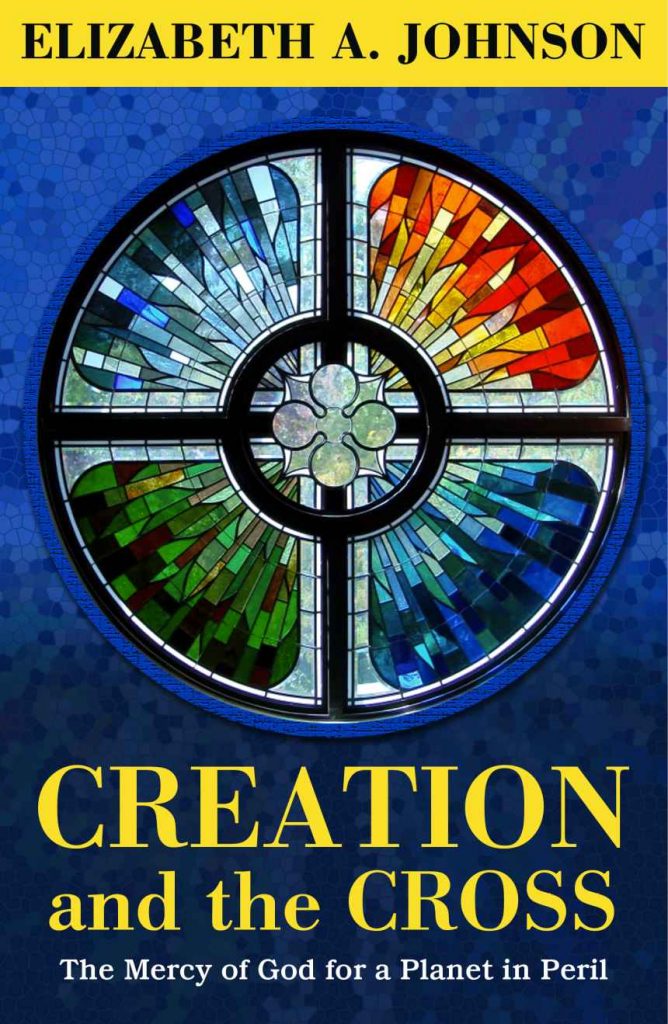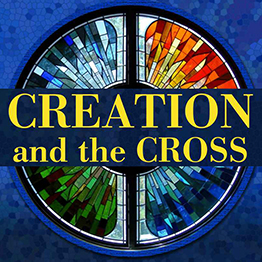
Creation and the Cross: the Mercy of God for a Planet in Peril by Elizabeth Johnson, CSJ | Orbis Press, 2018 | pp 256
Many people consider Sister Elizabeth Johnson, CSJ, the foremost theologian, let alone Catholic theologian, in the world today. Her newest book is entitled Creation and the Cross: the Mercy of God for a Planet in Peril (Orbis Books, Maryknoll, NY 2018). This book is delightfully written as a dialogue between Elizabeth and Clara (i.e., clarity) where Clara serves as a type of ‘Greek Chorus’ bringing in popular thought, or history, or rephrasing what Elizabeth just said. This is modeled on the same type of dialogue in his book, Cur Deus Homo (Why God Became Man), by Anselm of Canterbury (born 1033, died 1109). Not only is this book modeled on Anselm’s book, Creation and the Cross refutes it and tries to replace it with an understanding of Redemption that makes sense today.
Johnson begins her book with Anselm’s ‘Satisfaction Theory’ as an explanation for the Incarnation of Jesus Christ; namely, that God’s honor needed to be satisfied after the dishonor of the sin of Adam and Eve and all humanity. God has infinite honor and therefore requires infinite satisfaction to make it right. Jesus, being human, can offer the satisfaction and Jesus, being divine, makes that satisfaction infinite. Although this ‘Satisfaction Theory’ made sense in Anselm’s era, Elizabeth finds this just too medieval and too feudal, as well as not scriptural. The scriptures tell us that God has never requires satisfaction; rather, God restores, renews, comforts, and forgives throughout the scriptures. Johnson then looks at what other possible meanings are there for Jesus’ death (the Cross) besides satisfaction.
Beginning with scripture she sees a myriad of theologies of the Cross:
- salvation means to ‘salve’ or to heal – a medical metaphor,
- conquering sin and death – a military metaphor,
- reconciliation – ala where only the Prodigal Son, not the Father, needs it,
- redemption – a restorative metaphor (cloak returned, property returned),
- justification – a judicial metaphor when a judge declares you ‘not guilty,’
- sacrifice – a ceremony that restores ‘right relationship’ with God,
- adoption – a family metaphor for how we move from slave to son/daughter,
- rebirth – a family metaphor to how we move into the Divine family,
- nurturing – a family metaphor, how a mother (or father) nutures a child,
- new creation – a metaphor contrasting Old Adam and New Adam,
- servant – how the Servant Songs of 2nd Isaiah are metaphors for Jesus.
In all these, Johnson warns us to never literalize any metaphor, and that no one metaphor of these scriptural theologies of the Cross has been ‘declared’ as the official theology of the Cross by the Church. She notes that none of these scriptural meanings are ‘satisfactional;’ rather, they are all God-initiated and God-completed.
Johnson then asks if these are necessarily to humans only. She quotes John Muir, “When we try to pick out anything by itself, we find it hitched to everything else in the Universe.” Johnson agrees and she uses the term ‘Deep Incarnation’ to indicate that since everything is connected, Incarnation must be for everything. She then notes that the Cross and Resurrection are intrinsically tied; in fact, unified, to tell us that the Resurrection is for all creation and not just humanity. She notes that this idea is common in the Orthodox Churches’ understanding of Resurrection.
I would say that Chapter Six, “Conversion of Mind and Heart: Us,” is the lynchpin of Johnson’s book. She has effectively argued for a horizonal (not pyramidal) understanding of all creation including humanity’s place in creation. So through a series of five ‘thought experiments’ she tries to bring the reader to a “conversion of mind and heart” in our interaction with creation, especially regarding life on this planet. She notes that “dominion” does not mean domination. In the passage, “Then God said, ‘Let us make humankind in our image, according to our likeness; and let them have dominion over the fish of the sea, and over the birds of the air, and over the cattle, and over all the wild animals of the earth, and over every creeping thing that creeps upon the earth” (Genesis 1:26). God is giving them stewardship. She adds that a Lord (dominus, domina) was a steward in the king’s service. Johnson concludes, “An important step will be taken if Christians see that the grace of the crucified and risen Christ washes over all creation, to practical and critical effect.”
Although I have not read everything that Elizabeth Johnson has written (yes, there is a lot), but in this book and in her recent articles we see her thought move squarely into the center of a creation-centered and stewardship-centered theology. The contribution that an ecological ‘Theology of the Cross,’ seen so clearly in Creation and the Cross: the Mercy of God for a Planet in Peril, is a valuable and much-needed contribution to theology, to the Church, and to the world.

